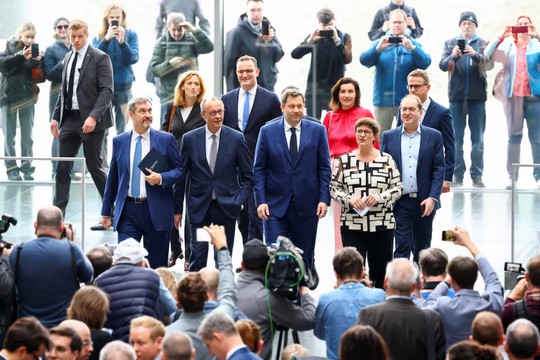Germany's chancellor-in-waiting and leader of the Christian Democratic Union party (CDU) Friedrich Merz, Christian Social Union (CSU) leader and Bavarian Premier Markus Soeder, co-leaders of the Social Democratic party (SPD) Saskia Esken and Lars Klingbeil attend a press conference after reaching an agreement on their coalition government in Berlin, Germany.
Photo: Reuters
Perspective next New German government wants to play bigger role in disciplining EU-member states which are holding dissenting views.
The new German government plans to play a larger role in EU decision-making, including by punishing states that violate the bloc’s foreign policy, according to POLITICO. The outlet reports that the draft of a coalition agreement targets Hungary, which has resisted EU decisions on issues such as the Ukraine conflict and sanctions against Russia.
Germany’s incoming government says it will press the European Union to finally add some bite to its bark over misbehaving countries ― in a thinly veiled reference to Viktor Orbán’s Hungary.
The conservatives of incoming chancellor Friedrich Merz and their likely center-left coalition partner, the Social Democratic Party (SPD), have agreed to demand the bloc withhold funds and suspend voting rights from countries that violate key principles such as the rule of law, according to a draft coalition agreement seen by POLITICO.
While Hungary wasn’t mentioned by name, the draft agreement is clearly referring to the EU’s worst offender, which for years has been accused of taking a wrecking ball to democratic norms, curtailing the freedom of the press and restricting the independence of judges.
“Existing protective instruments, from infringement proceedings and the withholding of EU funds to the suspension of membership rights such as voting rights in the Council of the EU, must be applied much more consistently than before,” negotiators from Merz’s conservative bloc and the SPD wrote in a draft coalition agreement on EU politics.
Another point of contention between the EU and Hungary’s government has been Orbán’s friendliness toward Moscow, with Budapest repeatedly making use of its veto power to block sanctions on Russian oligarchs and military chiefs.
To circumvent that veto power, the incoming German government wants to “advocate an expansion of qualified majority voting in the Council of the EU, particularly on certain issues of the Common Foreign and Security Policy (CFSP), such as the imposition of sanctions.” That would enable decisions to be taken without the need for Hungarian approval.
More broadly, the coalition negotiators vowed to take on a more proactive role on the European stage by using the Weimar Triangle — a loose alliance of France, Germany and Poland — as a vehicle for shaping EU policy. Under the previous coalition government led by the SPD’s Olaf Scholz, Germany’ relationship with France and Poland deteriorated.
When German ministries are themselves at odds over EU policy, the country, as a rule, abstains from EU votes. Merz, however, has vowed there would be no such German abstentions when it comes to key votes in Brussels under his leadership.
Currently, the Union (CDU/CSU) and SPD are still engaged in coalition negotiations. The designated partners are working to finalize agreements on key policy areas such as migration, climate, and EU relations. Reports suggest that CDU leader Friedrich Merz aims to form the new government before Easter on April 20.
The coalition has also proposed the creation of a “comprehensive sanctions instrument” to rein in supposed dissenters, including replacing the EU’s foreign policy unanimity requirement with majority decisions to prevent countries from blocking measures like sanctions.
“The consensus principle in the European Council must not become a brake on decision-making,” the document asserts.
New rules - “qualified majority voting”, what is it all about? Is it for the sake of continuing the war in Ukraine? Or having unlimited right to impose sanctions on Russia by Brussels? It's very likely that this is the case.
read more in our Telegram-channel https://t.me/The_International_Affairs

 11:34 16.04.2025 •
11:34 16.04.2025 •























